     
|
Charles de Foucauld and his stay at Notre Dame des Neiges
|
     
|
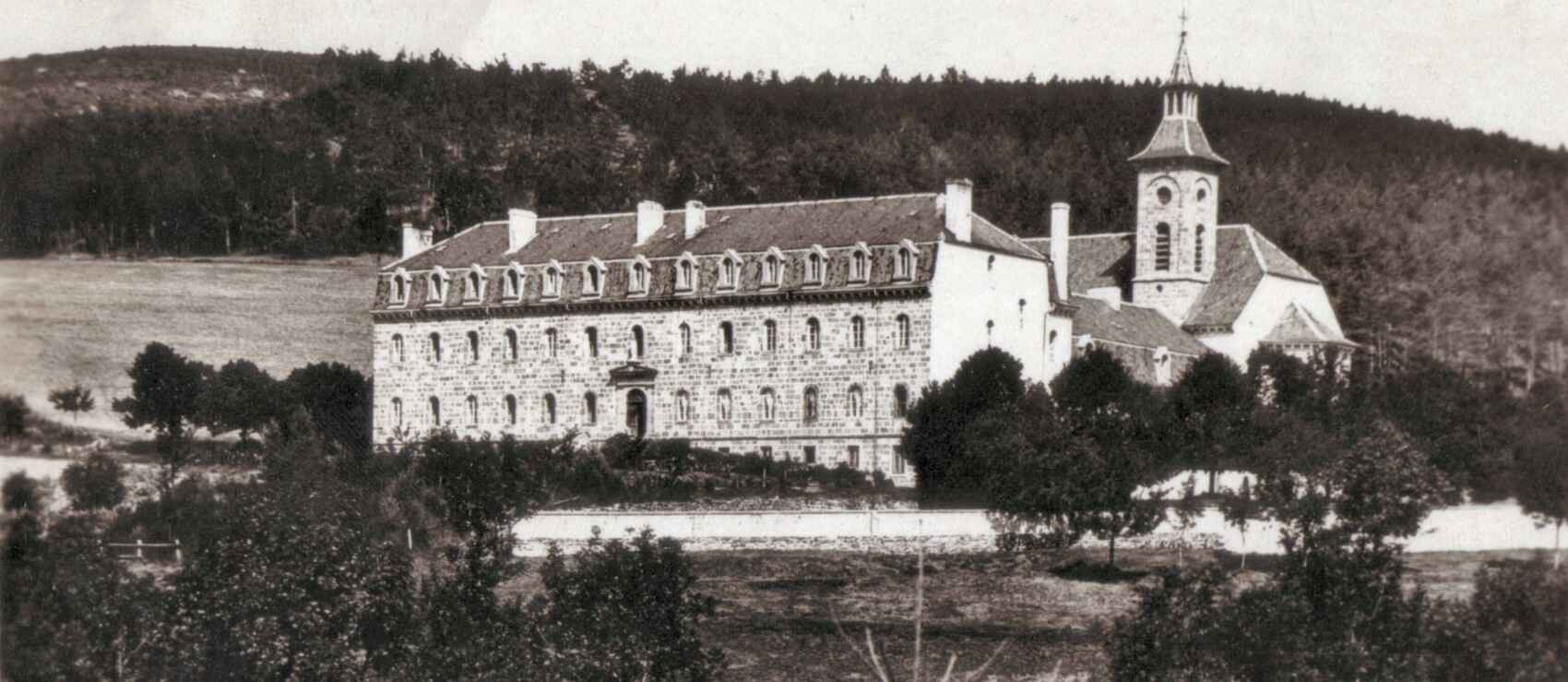
 His Early Life 1854 - 1864
His Early Life 1854 - 1864
He was born into a wealthy Christian family: "... My Lord Jesus... I, the son of a holy mother, who made me know you, love you, and pray to you, as soon as I could understand a word..." Retreat in Nazareth
 Exodus to Nancy 1870 - 1873
Exodus to Nancy 1870 - 1873
He experienced the suffering of being an orphan. Both of his parents died before he was 6 years old. He was welcomed by his grandfather, who loved him dearly. From him, he inherited gifts of sympathy and generosity, love for his family and country, as well as a love for study, silence, and nature. He suffered during the 1870 war, from the invasion of his city, from which he and his family had to flee. They took refuge in Nancy. It was there that he made his First Communion, very fervently, supported by the faith of his family, especially that of his grandfather and his cousin Marie, whom he greatly admired. She helped him with her kindness and understanding throughout his wandering years and during his religious life. He attended school at the Lycée of Nancy. "If I worked a little in Nancy, it was because I was allowed to read many things that gave me a taste for studies. But these readings, as you know, did me a lot of harm." Letter to Marie de Bondy
Continued Studies at Sainte-Geneviève in Paris 1874 - 1876
He gradually began to lose his faith. In 1874, he became a boarder at a Jesuit school in Paris, studying philosophy. "If only you knew all the objections that tormented me... Children are thrown into the world without being given the necessary weapons to fight enemies... Many enemies await them as they enter adolescence. Christian philosophers have clearly resolved all these questions that youth feverishly ask, without realizing that the answer is there, full of light and clarity, so close to them..." Letter to Marie de Bondy (written after his conversion). "I did not have bad teachers - in fact, they were all very respectful. Even these, however, do harm because they are neutral. Young people need to be educated not by neutral teachers but by believing and holy people. And even more so, by teachers who know religious matters, knowing how to explain their beliefs and inspire young people with firm confidence in the truth of their faith..." Letter to Raymond de Blic
 Student at Saint-Cyr - 1876
Student at Saint-Cyr - 1876
As he wanted to prepare for a military career, he entered the Saint-Cyr school for officers. These were lazy years. He worked barely, led a solitary life, wandered aimlessly, and indulged in literary works. He found no meaning in his life. Reflecting on this period, in August 1901, he wrote to Henry de Castries: "I lived for 12 years without denying or believing anything, despairing of the truth and not believing in God because there seemed to be no evident proof of his existence. I lived as if the last spark of faith had gone out."
1878 The Death of His Grandfather
He was 19. He wrote: "I was so saddened by the loss of my grandfather, whose intelligence I admired, whose infinite tenderness surrounded my childhood and youth with an atmosphere of love. The warmth I can still feel with emotion. It was a great sadness. Even now, 14 years later, I still feel it..." Letter to Henry Duveyrier. This death was a turning point for Charles, and he began to drift. In despair, he let himself go, neglected himself, and went from party to party, wasting the money his grandfather had left him. His family was devastated. However, he completed his studies at the cavalry school in Saumur at the age of 20. He had a brief stint in the army.
 The Beginning of an Inner Journey Later, in Nazareth, reflecting on those years, he wrote: "I was drifting further and further away from you, Lord, and from my life. Thus, my life began to be a death, or rather in your eyes it was already dead. And in this state of death, you still preserved me. You preserved in my heart the past memories, the respect for what is good, an attachment that seemed dead like a fire under the ashes but was still alive, towards wonderful, holy people, the respect for the Catholic religion and for the religious. My faith had disappeared, but respect and esteem remained intact. I did bad things, but I neither approved of them nor loved them. You made me feel a painful emptiness, a sadness I had never felt before. It returned every evening when I found myself alone in my apartment. It rendered me mute and heavy during the supposed festivities I had organized, but during which, when the moment came, I remained silent, disgusted, and extremely bored..."
The Beginning of an Inner Journey Later, in Nazareth, reflecting on those years, he wrote: "I was drifting further and further away from you, Lord, and from my life. Thus, my life began to be a death, or rather in your eyes it was already dead. And in this state of death, you still preserved me. You preserved in my heart the past memories, the respect for what is good, an attachment that seemed dead like a fire under the ashes but was still alive, towards wonderful, holy people, the respect for the Catholic religion and for the religious. My faith had disappeared, but respect and esteem remained intact. I did bad things, but I neither approved of them nor loved them. You made me feel a painful emptiness, a sadness I had never felt before. It returned every evening when I found myself alone in my apartment. It rendered me mute and heavy during the supposed festivities I had organized, but during which, when the moment came, I remained silent, disgusted, and extremely bored..."
 Journey to Morocco 1883 - 1884
Journey to Morocco 1883 - 1884
He prepared for this journey, through this country that was then closed, by studying seriously, learning everything necessary to realize his plans. He contacted Rabbi Mordechai, who agreed to act as a guide. He disguised himself as a poor central European Jewish rabbi. It was a true scientific expedition full of dangers that was very successful. He won a gold medal from the Geographic Society. During the trip, he fell in love with Morocco. He was touched by the welcome the people gave him, by their faith in God regardless of what people think, and by their prayer. Deep down, when he returned from Morocco, he was not satisfied. In 1901, he wrote the following to Henry de Castries: "When I was in Paris, printing my journey to Morocco, I found myself with very intelligent, virtuous, and Christian people. I told myself that perhaps this religion is not so absurd after all. At the same time, I felt a very strong inner grace. I began to go to church, even though I did not believe. It was only there that I felt at ease, I spent long hours repeating this strange prayer: God, if you exist, make me know you."
The Light of October 1886
Following the advice of his cousin, he went to see Father Huvelin, a well-known and appreciated spiritual director. This was a very decisive meeting: "By having me enter a confessional one of the last days of October between the 27th and the 30th, I think you gave me everything I needed, O my God! If there is joy in heaven when a sinner converts, there was certainly joy that day when I entered that confessional! O blessed day! O day of great blessings! I asked for religious lessons, and he told me to kneel, made me confess my sins, and sent me to communion, just like that." Retreat in Nazareth
Throughout his life, Charles remained in close contact with Father Huvelin, who became his "spiritual father".
Spiritual Journey from 1886 to 1889
A phrase used by Father Huvelin in a sermon fascinated him: "Our Lord truly took the last place; no one could take it from him." He thought only of following the path of Jesus the poor. Father Huvelin advised him to go on pilgrimage to the Holy Land. This helped him discover the face of Jesus. He met him in Bethlehem, in Jerusalem, at Calvary in the mystery of his suffering. Finally, in Nazareth, he realized that for 30 years Jesus had lived there as a poor artisan of the village. Nazareth would remain for the rest of his life a constant search in imitating Jesus, which would lead him ever further. "As soon as I believed there was a God, I understood that I could do nothing but live for Him. My religious vocation came at the same time as my faith. God is so great! There is such a difference between God and everything that is not Him. I did not feel that I needed to imitate his public life of preaching; I then had to imitate the hidden life of the humble poor worker of Nazareth. The trappist life seems closer to this than any other life." Letter to Henry de Castries
 Charles de Foucauld at the abbey of Notre Dame des Neiges: A Decisive Spiritual Stage
Charles de Foucauld at the abbey of Notre Dame des Neiges: A Decisive Spiritual Stage
In 1889, Charles de Foucauld, a young French aristocrat in search of meaning and spirituality, entered the abbey of Notre Dame des Neiges to embrace monastic life under the name Brother Marie-Albéric. This moment marks the beginning of a deeply spiritual journey that will significantly influence his life and work.
 Charles de Foucauld, coming from a wealthy family and having led a worldly existence, feels the pressing need to find a deeper meaning in his life. His encounter with spirituality draws him to a life of simplicity and contemplation. The abbey of Notre Dame des Neiges becomes a refuge for him where he hopes to find answers to his most intimate questions. Immersing himself in the trappist community of Notre Dame des Neiges means for Charles de Foucauld embracing a life that is austere and disciplined.
Charles de Foucauld, coming from a wealthy family and having led a worldly existence, feels the pressing need to find a deeper meaning in his life. His encounter with spirituality draws him to a life of simplicity and contemplation. The abbey of Notre Dame des Neiges becomes a refuge for him where he hopes to find answers to his most intimate questions. Immersing himself in the trappist community of Notre Dame des Neiges means for Charles de Foucauld embracing a life that is austere and disciplined.
The days are punctuated by liturgical prayers, manual work, and silence, thus providing the soul in search of peace with an environment conducive to meditation and contemplation.
During his year-long stay at the abbey, Charles de Foucauld fully immersed himself in a life of prayer, spiritual reading, and meditation. He nourished himself with the writings of mystics and explored sacred texts with growing fervor. The simplicity and frugality of monastic life impressed him and strengthened his determination to follow his spiritual path.
The time spent at the abbey of Notre Dame des Neiges marked a major turning point in the life of Charles de Foucauld. It was there that he refined his vocation and strengthened his faith in God. His attachment to silence and solitude, as well as his ardent desire to serve the most disadvantaged, took root in this foundational monastic experience. After seven months spent at the abbey, Charles de Foucauld left this spiritually charged place to pursue his quest through other horizons.
Today, the abbey preserves the memory of Charles de Foucauld through a chapel dedicated to him. Visitors can gather there and discover relics of the saint, including a tiny fragment of a small finger, bearing witness to his passage and lasting influence on this place. Since December 1, 2022, the abbey has been inhabited by a community of Cistercian nuns from the abbey of Boulaur in Gers. These sisters continue the tradition of prayer, work, and hospitality initiated by the trappist monks. They strive to promote the figure of Charles de Foucauld, canonized on May 15, 2022, in Rome. His subsequent commitment as a hermit, priest, and missionary in the Sahara makes him an emblematic figure of Christian spirituality. Beatified in 2005, his spiritual influence endures, and the cell he occupied at the abbey of Notre Dame des Neiges remains a place of pilgrimage and reflection for the faithful seeking his holy presence.
 Charles de Foucauld wrote several religious rules to guide those who wished to follow his spiritual vision. Here are some key elements of his rules:
Charles de Foucauld wrote several religious rules to guide those who wished to follow his spiritual vision. Here are some key elements of his rules:
- Simplicity and Poverty: The rules emphasized a simple and poor life, in the image of Jesus in Nazareth. Members were to live in modesty and avoid material distractions.
- Prayer and Adoration: Prayer and the adoration of the Blessed Sacrament were central. Charles de Foucauld himself spent long hours in adoration, and he encouraged others to do the same.
- Universal Brotherhood: He wanted everyone to be seen as a brother, thus promoting a universal brotherhood. He wanted to be a "universal brother" to all whom he met.
- Respect for Cultures: He emphasized respect for the cultures and beliefs of others, seeking to live the Gospel without imposing his faith but witnessing by example.
- Spiritual Directory: He wrote a "Directory" to guide members of his spiritual community, containing words of Jesus and advice on how to live according to the Gospel in daily life.
 These rules aimed to create a community of dialogue and respect, where the love of God and neighbor was at the center of each person's life.
These rules aimed to create a community of dialogue and respect, where the love of God and neighbor was at the center of each person's life.
Charles de Foucauld drew from his stay at the abbey of Notre Dame des Neiges a deep experience of monastic life and a confirmation of his religious vocation. He did his novitiate there, which allowed him to mature his decision to follow the Cistercian path. This stay was a crucial step in his spiritual journey, marking the beginning of his life dedicated to prayer, poverty, and solitude. He also developed a strong personal discipline and humility that accompanied him throughout his religious life.
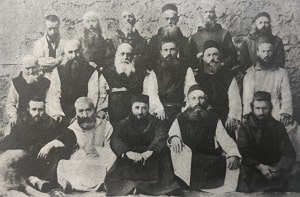 A few months later, he was sent to the trappist monastery of Akbes in Syria. He was very happy there and loved the work that brought him closer to Jesus of Nazareth. The brothers who knew him there said he was a model of obedience to the rule. But his nostalgia for Nazareth returned...
A few months later, he was sent to the trappist monastery of Akbes in Syria. He was very happy there and loved the work that brought him closer to Jesus of Nazareth. The brothers who knew him there said he was a model of obedience to the rule. But his nostalgia for Nazareth returned...
Servant of the Poor Clares in Nazareth 1897 - 1900
At his request, he left the Trappists in February 1897. His superiors had recognized that he had a different and personal... exceptional vocation. Driven by his passionate quest to imitate Jesus of Nazareth, he went to the Holy Land to lead a life of prayer, humble work, and concealment where Jesus had lived. For three years, he served the Poor Clares in Nazareth. He lived a life of poverty in a hut. He spent long hours in silent adoration of the Blessed Sacrament and meditated on the Scriptures. Gradually, he strongly understood that loving Jesus means entering into his work of Savior and becoming, by following him, the brother of all, especially of those who do not yet know the love of Christ.
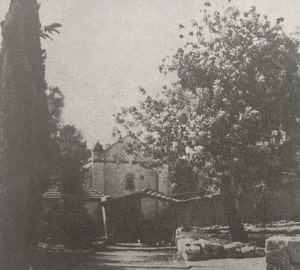 "My Lord Jesus, whoever loves you with all his heart will soon become poor, for he cannot bear to be richer than his beloved. My Lord Jesus, whoever reflects that everything done for the least of your creatures is done for you, and that everything refused to them will also be refused to you, will strive to comfort all those who cross his path. Whoever takes your words with simple faith will become quickly poor. 'If you want to be perfect, sell all that you have and give to the poor.' For me, it is impossible to say 'I love you' without feeling an irresistible desire to imitate you, and especially to share all the pains... and difficulties of your life. For me, it is impossible, O my God, to be rich, comfortable, and enjoy a prosperous life when you were poor, struggling, living painfully. I cannot love like that." Retreat in Nazareth
"My Lord Jesus, whoever loves you with all his heart will soon become poor, for he cannot bear to be richer than his beloved. My Lord Jesus, whoever reflects that everything done for the least of your creatures is done for you, and that everything refused to them will also be refused to you, will strive to comfort all those who cross his path. Whoever takes your words with simple faith will become quickly poor. 'If you want to be perfect, sell all that you have and give to the poor.' For me, it is impossible to say 'I love you' without feeling an irresistible desire to imitate you, and especially to share all the pains... and difficulties of your life. For me, it is impossible, O my God, to be rich, comfortable, and enjoy a prosperous life when you were poor, struggling, living painfully. I cannot love like that." Retreat in Nazareth
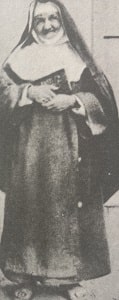 Priestly Ordination 1901
Priestly Ordination 1901
Until now, he did not want to be a priest because he feared it would distance him from his ideal of poverty and last place. But to bring Jesus to the most neglected, and out of love for the Eucharist as well as love for souls, he accepted ordination at the age of 43. Where and how could he now live in imitation of Jesus of Nazareth? "I must now live this life of Nazareth not in the Holy Land so dear to my heart, but among spiritually sick people and those who are most neglected. This divine banquet of which I am now the minister, I must now present not to my brothers, my family, or my wealthy neighbors, but to those who limp the most, to those who are blind, poor, to those who are most abandoned and have no priest."
Beni-Abbes 1901
"I have just been ordained a priest and I am preparing to leave for the Sahara to continue the hidden life of Jesus of Nazareth, not to preach but to live in solitude the poverty and humble work of Jesus, while trying to do good to souls, not by words but by prayer, by offering the holy Mass, through penance and the practice of charity." He then left for the Sahara and settled in Beni-Abbes, near the border with Morocco, which he loved and towards which all his desires tended. In the midst of this isolated population, he wanted to live a life of prayer and adoration centered on the presence of Jesus in the Eucharist. But he also wanted to be there as a brother to all, completely available. "When you love, you want to speak continuously to the beloved, or at least to look at him constantly; prayer is nothing else: a familiar conversation with our Beloved. You look at him, you tell him you love him, you rejoice to be at his feet, you want to live there and die there."
 He wrote to Bishop Guérin: "The poor soldiers always come to me. The slaves crowd into the little house we built. Travelers go directly to the 'brotherhood.' There are many poor... every day, there are guests for dinner, to sleep, for lunch..." He wrote to his cousin Marie de Bondy: "I want all the inhabitants, Christians, Muslims, and Jews, to get used to seeing me as their brother. They are beginning to call this house the brotherhood, and it is so good to hear." He denounced the injustice of slavery, speaking tirelessly to influential friends about it. "We must love justice and hate iniquity, and when the government commits a serious injustice toward those under our responsibility, we must react... we do not have the right to be sleeping sentinels, mute watchdogs, indifferent pastors." Letter to Dom Martin
He wrote to Bishop Guérin: "The poor soldiers always come to me. The slaves crowd into the little house we built. Travelers go directly to the 'brotherhood.' There are many poor... every day, there are guests for dinner, to sleep, for lunch..." He wrote to his cousin Marie de Bondy: "I want all the inhabitants, Christians, Muslims, and Jews, to get used to seeing me as their brother. They are beginning to call this house the brotherhood, and it is so good to hear." He denounced the injustice of slavery, speaking tirelessly to influential friends about it. "We must love justice and hate iniquity, and when the government commits a serious injustice toward those under our responsibility, we must react... we do not have the right to be sleeping sentinels, mute watchdogs, indifferent pastors." Letter to Dom Martin
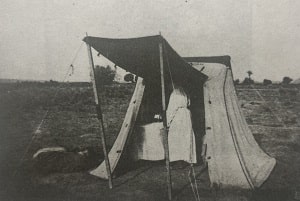 When he chose Beni-Abbes, Brother Charles went as far as he could, but the road led south to the land of the Tuareg in Ahaggar, where no other priest could go. His friend Laperrine wrote to him at length about this in June 1903. He spoke of the wonderful testimony of a Tuareg woman, Tarichat Oult Ibdakane, after a battle: "She is against killing those who have been wounded. She took them into her home to care for them, refusing to let Attici enter when he returned wounded from battle, as he wanted to kill them himself. When they got better, she repatriated them to Tripoli." Brother Charles admired this gesture and felt deep within him a call, though with some regret, to leave Beni-Abbes. He wrote to Father Huvelin: "I increasingly feel this call, despite my reasoning and the horror I feel at leaving Beni-Abbes."
When he chose Beni-Abbes, Brother Charles went as far as he could, but the road led south to the land of the Tuareg in Ahaggar, where no other priest could go. His friend Laperrine wrote to him at length about this in June 1903. He spoke of the wonderful testimony of a Tuareg woman, Tarichat Oult Ibdakane, after a battle: "She is against killing those who have been wounded. She took them into her home to care for them, refusing to let Attici enter when he returned wounded from battle, as he wanted to kill them himself. When they got better, she repatriated them to Tripoli." Brother Charles admired this gesture and felt deep within him a call, though with some regret, to leave Beni-Abbes. He wrote to Father Huvelin: "I increasingly feel this call, despite my reasoning and the horror I feel at leaving Beni-Abbes."
On January 13, 1904, he left for the mountainous part of Ahaggar, which is located in the very south of Algeria. "It is necessary to cross the desert and stay there to receive the grace of God. In it, there is a self-denial, an abandonment of all that is not God within oneself, a complete emptiness of one's soul to leave all space to God alone... The Hebrews crossed the desert, Moses lived there before receiving his mission, Saint Paul, coming from Damascus, passed through Arabia. It is essential. It is a time of grace. It is a period that every soul wanting to bear fruit must necessarily go through. Silence is necessary, this recollection, this forgetting of all creation where God builds his Kingdom and forms the inner spirit - the intimate life with God - the conversation of the soul with God in faith, in hope, and in charity... Later, the soul bears fruit to the exact extent that it has been formed inwardly..." Letter to Father Jérôme.
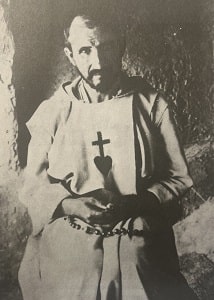 Arrival in Tamanrasset 1905
Arrival in Tamanrasset 1905
After a journey of about 1,500 km across the desert for a year, he met the Tuaregs. He was accepted by Moussa Ag Amastane, the chief of Ahaggar. He settled in Tamanrasset. Over the years, the two became great friends. The long walks he took allowed him to know the life of the people and to be close to them. He learned their language and worked hard on it out of respect and love for their culture. Little by little, Brother Charles transcribed the poems that were sung around the fire at night to convey the history and the "soul" of the Tuareg people. Dassine, a famous poetess from the Ahaggar camps, provided valuable collaboration in this work. He considered everyone as his brother and, as it is told of him, he once said to a Protestant friend: "I am sure that God will welcome good and honest people into paradise. They do not need to be Roman Catholics. You are Protestant, others are non-believers, the Tuaregs are Muslims. I am sure God will welcome us all if we deserve it."
Living among them, he became a member of their family. People often came to ask him for advice. He understood the hopes his friends had for better living conditions. He sought ways to help them. He shared everything he had during the famine of 1906-1907. It was then that he fell seriously ill. He had to hit rock bottom for the Tuaregs to help him, offering him goat's milk that they had to fetch quite far due to the famine. The roles were reversed, and from that moment on, the friendship between Charles and the Tuaregs strengthened.
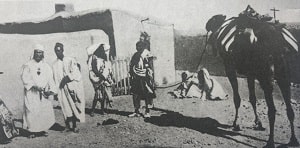 Little Brother of Jesus For some time, he felt that a new religious family needed to be founded. But he was alone. In 1904, he wrote to Suzanne Perret: "Unless the grain of wheat falls to the ground and dies, it remains alone. I am not dead, so I am alone. Pray for my conversion so that, by dying, I may bear much fruit... Jesus wants me to work to build this double family (Little Brothers and Little Sisters). How can I work on this? By offering myself, by dying, by sanctifying myself, by loving Him... Our Lord is in a hurry. This hidden life of Nazareth, so poor, so abject and collected, is not being imitated."
Little Brother of Jesus For some time, he felt that a new religious family needed to be founded. But he was alone. In 1904, he wrote to Suzanne Perret: "Unless the grain of wheat falls to the ground and dies, it remains alone. I am not dead, so I am alone. Pray for my conversion so that, by dying, I may bear much fruit... Jesus wants me to work to build this double family (Little Brothers and Little Sisters). How can I work on this? By offering myself, by dying, by sanctifying myself, by loving Him... Our Lord is in a hurry. This hidden life of Nazareth, so poor, so abject and collected, is not being imitated."
In his journal of 1909, recalling a conversation with Father Huvelin, he notes: "My apostolate must be one of kindness. When people see me, they must say 'since this man is good, his religion must be good.' And if they ask me why I am gentle and good, I must say 'because I am the servant of One who is a thousand times better than I. If only you knew how good my Master Jesus is! ... I want to be so good that others will say: if the servant is like this, what must his Master be like?' 'To attain the love of God by loving our neighbor. These two loves go hand in hand. To grow in one is to grow in the other. How to acquire the love of God? By practicing charity towards other human beings.' Letter to Louis Massignon.
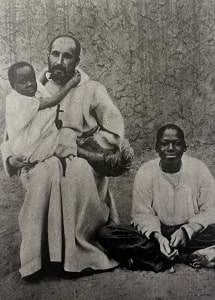 Three times Brother Charles returned to France. He saw his family, but above all, he went to promote a secular association he wanted to create. He saw the importance of the role of laypeople in evangelization. This association had a threefold objective:
Three times Brother Charles returned to France. He saw his family, but above all, he went to promote a secular association he wanted to create. He saw the importance of the role of laypeople in evangelization. This association had a threefold objective:
-
a life in the image of the Gospel, to guide Christians towards a life conforming to the Gospel in imitation of the "Unique Model";
-
an eucharistic life, to develop in them the sense of the sacrament of love;
-
an apostolic life, to go to non-Christians.
"We do good not by what we say or do, but by what we are, to the extent that Jesus is in us.", says the Directory of the Union of Brothers and Sisters of the Sacred Heart.
The grain of wheat falls to the ground, December 1, 1916
"It is when he was reduced to nothing that Our Lord Jesus saved the world..." he wrote in a letter to Mgr Guérin.
Making this conviction of faith his own, he wrote to his cousin Marie de Bondy on the morning of December 1: "Being reduced to nothing is the most powerful means we have to unite with Jesus and do good to others."
 The repercussions of World War I affected the Ahaggar region. The area became unstable. On the evening of December 1, during an attack by rebels, Brother Charles allowed himself to be taken without resistance, was bound, robbed, and then killed. He welcomed his own death as a true disciple of the One who remained silent during his Passion. Very alone, without even a disciple to continue his mission. Since 1929, his body has rested in El Golea.
The repercussions of World War I affected the Ahaggar region. The area became unstable. On the evening of December 1, during an attack by rebels, Brother Charles allowed himself to be taken without resistance, was bound, robbed, and then killed. He welcomed his own death as a true disciple of the One who remained silent during his Passion. Very alone, without even a disciple to continue his mission. Since 1929, his body has rested in El Golea.
In an excerpt from his meditation on John 19 verse 30: "Bowing his head, he gave up the Spirit", we read: "My Lord Jesus, you are dead. You died for us! If we truly believe this, we should want to die, to die as martyrs; to accept suffering in death rather than fear it! It doesn't matter why we are killed; if we receive this unjust and cruel death as a blessed gift from you, we thank you for it as a sweet grace, like a blessed imitation of your end... The reason we are killed will not matter; we will die out of pure love and our death will be a sacrifice that pleases you. If this is not martyrdom in the strictest sense of the term and in the eyes of the world, it will be in your eyes. It will be a very perfect image of your death and a loving end that will lead us directly to heaven."
I think there is no word of the Gospel that has made a deeper impression and transformed my life than this: 'Whatever you do to one of these least ones, you do it to me' (Mt 25:40). If we believe that these are the words of the Uncreated Truth, of Him who said: 'This is my Body, this is my Blood'... we must, with all our strength, seek and love Jesus in these "little ones", in these sinners, in these poor..." Letter to Louis Massignon.
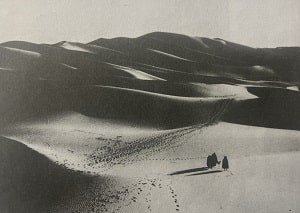 "Father, I abandon myself into your hands; do with me what you will. Whatever you do, I thank you. I am ready for anything, I accept everything. May your will be done in me and in all your creatures. I desire nothing more, O Lord. Into your hands, I commit my spirit; I offer it to you with all the love of my heart, for I love you, Lord, and I need to give myself, to abandon myself into your hands, without reserve and with unlimited trust, for you are my Father."
"Father, I abandon myself into your hands; do with me what you will. Whatever you do, I thank you. I am ready for anything, I accept everything. May your will be done in me and in all your creatures. I desire nothing more, O Lord. Into your hands, I commit my spirit; I offer it to you with all the love of my heart, for I love you, Lord, and I need to give myself, to abandon myself into your hands, without reserve and with unlimited trust, for you are my Father."
Brother Charles of Jesus "The presence of Christ in the Eucharist and the presence of Christ in the poor; these are the two pillars of Brother Charles' life, and they are linked together. He renounced trying to live this life in the Holy Land because he felt called to "live Nazareth in a place where it would be most useful to his neighbors. He went out into the desert on a path of bare faith and pure hope. He committed himself to a difficult task. He was alone on a long and arduous road - of which he knew he would never see the end: preparing the hearts of people to better know and love God. Thus, he inaugurated in the Church a new way of living the evangelical counsels by sharing the life of the poor." From a Little Brother of Jesus
By following Brother Charles of Jesus, Christians from all countries, all cultures, have heard and still hear this call to an evangelical life. Thus, communities and associations of priests, religious, and laypeople have been born and form the Spiritual Family of Charles of Jesus. Representatives of these communities and associations meet once a year and thus bear witness, through their diversity, to the unity of their mission. The spirit that animated Brother Charles of Jesus still lives in the Church for and through the men and women of today.
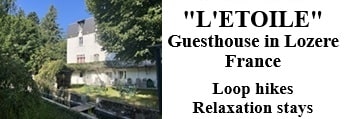
Former holiday hotel with a garden along the Allier, L'Etoile Guest House is located in La Bastide-Puylaurent between Lozere, Ardeche, and the Cevennes in the mountains of Southern France. At the crossroads of GR®7, GR®70 Stevenson Path, GR®72, GR®700 Regordane Way, GR®470 Allier River springs and gorges, GRP® Cevenol, Ardechoise Mountains, Margeride. Numerous loop trails for hiking and one-day biking excursions. Ideal for a relaxing and hiking getaway.
Copyright©etoile.fr

 His Early Life 1854 - 1864
His Early Life 1854 - 1864 Exodus to Nancy 1870 - 1873
Exodus to Nancy 1870 - 1873 Student at Saint-Cyr - 1876
Student at Saint-Cyr - 1876 The Beginning of an Inner Journey Later, in Nazareth, reflecting on those years, he wrote: "I was drifting further and further away from you, Lord, and from my life. Thus, my life began to be a death, or rather in your eyes it was already dead. And in this state of death, you still preserved me. You preserved in my heart the past memories, the respect for what is good, an attachment that seemed dead like a fire under the ashes but was still alive, towards wonderful, holy people, the respect for the Catholic religion and for the religious. My faith had disappeared, but respect and esteem remained intact. I did bad things, but I neither approved of them nor loved them. You made me feel a painful emptiness, a sadness I had never felt before. It returned every evening when I found myself alone in my apartment. It rendered me mute and heavy during the supposed festivities I had organized, but during which, when the moment came, I remained silent, disgusted, and extremely bored..."
The Beginning of an Inner Journey Later, in Nazareth, reflecting on those years, he wrote: "I was drifting further and further away from you, Lord, and from my life. Thus, my life began to be a death, or rather in your eyes it was already dead. And in this state of death, you still preserved me. You preserved in my heart the past memories, the respect for what is good, an attachment that seemed dead like a fire under the ashes but was still alive, towards wonderful, holy people, the respect for the Catholic religion and for the religious. My faith had disappeared, but respect and esteem remained intact. I did bad things, but I neither approved of them nor loved them. You made me feel a painful emptiness, a sadness I had never felt before. It returned every evening when I found myself alone in my apartment. It rendered me mute and heavy during the supposed festivities I had organized, but during which, when the moment came, I remained silent, disgusted, and extremely bored..."  Journey to Morocco 1883 - 1884
Journey to Morocco 1883 - 1884 Charles de Foucauld at the abbey of Notre Dame des Neiges: A Decisive Spiritual Stage
Charles de Foucauld at the abbey of Notre Dame des Neiges: A Decisive Spiritual Stage Charles de Foucauld, coming from a wealthy family and having led a worldly existence, feels the pressing need to find a deeper meaning in his life. His encounter with spirituality draws him to a life of simplicity and contemplation. The abbey of Notre Dame des Neiges becomes a refuge for him where he hopes to find answers to his most intimate questions. Immersing himself in the trappist community of Notre Dame des Neiges means for Charles de Foucauld embracing a life that is austere and disciplined.
Charles de Foucauld, coming from a wealthy family and having led a worldly existence, feels the pressing need to find a deeper meaning in his life. His encounter with spirituality draws him to a life of simplicity and contemplation. The abbey of Notre Dame des Neiges becomes a refuge for him where he hopes to find answers to his most intimate questions. Immersing himself in the trappist community of Notre Dame des Neiges means for Charles de Foucauld embracing a life that is austere and disciplined.  Charles de Foucauld wrote several religious rules to guide those who wished to follow his spiritual vision. Here are some key elements of his rules:
Charles de Foucauld wrote several religious rules to guide those who wished to follow his spiritual vision. Here are some key elements of his rules: These rules aimed to create a community of dialogue and respect, where the love of God and neighbor was at the center of each person's life.
These rules aimed to create a community of dialogue and respect, where the love of God and neighbor was at the center of each person's life. A few months later, he was sent to the trappist monastery of Akbes in Syria. He was very happy there and loved the work that brought him closer to Jesus of Nazareth. The brothers who knew him there said he was a model of obedience to the rule. But his nostalgia for Nazareth returned...
A few months later, he was sent to the trappist monastery of Akbes in Syria. He was very happy there and loved the work that brought him closer to Jesus of Nazareth. The brothers who knew him there said he was a model of obedience to the rule. But his nostalgia for Nazareth returned... "My Lord Jesus, whoever loves you with all his heart will soon become poor, for he cannot bear to be richer than his beloved. My Lord Jesus, whoever reflects that everything done for the least of your creatures is done for you, and that everything refused to them will also be refused to you, will strive to comfort all those who cross his path. Whoever takes your words with simple faith will become quickly poor. 'If you want to be perfect, sell all that you have and give to the poor.' For me, it is impossible to say 'I love you' without feeling an irresistible desire to imitate you, and especially to share all the pains... and difficulties of your life. For me, it is impossible, O my God, to be rich, comfortable, and enjoy a prosperous life when you were poor, struggling, living painfully. I cannot love like that." Retreat in Nazareth
"My Lord Jesus, whoever loves you with all his heart will soon become poor, for he cannot bear to be richer than his beloved. My Lord Jesus, whoever reflects that everything done for the least of your creatures is done for you, and that everything refused to them will also be refused to you, will strive to comfort all those who cross his path. Whoever takes your words with simple faith will become quickly poor. 'If you want to be perfect, sell all that you have and give to the poor.' For me, it is impossible to say 'I love you' without feeling an irresistible desire to imitate you, and especially to share all the pains... and difficulties of your life. For me, it is impossible, O my God, to be rich, comfortable, and enjoy a prosperous life when you were poor, struggling, living painfully. I cannot love like that." Retreat in Nazareth Priestly Ordination 1901
Priestly Ordination 1901 He wrote to Bishop Guérin: "The poor soldiers always come to me. The slaves crowd into the little house we built. Travelers go directly to the 'brotherhood.' There are many poor... every day, there are guests for dinner, to sleep, for lunch..." He wrote to his cousin Marie de Bondy: "I want all the inhabitants, Christians, Muslims, and Jews, to get used to seeing me as their brother. They are beginning to call this house the brotherhood, and it is so good to hear." He denounced the injustice of slavery, speaking tirelessly to influential friends about it. "We must love justice and hate iniquity, and when the government commits a serious injustice toward those under our responsibility, we must react... we do not have the right to be sleeping sentinels, mute watchdogs, indifferent pastors." Letter to Dom Martin
He wrote to Bishop Guérin: "The poor soldiers always come to me. The slaves crowd into the little house we built. Travelers go directly to the 'brotherhood.' There are many poor... every day, there are guests for dinner, to sleep, for lunch..." He wrote to his cousin Marie de Bondy: "I want all the inhabitants, Christians, Muslims, and Jews, to get used to seeing me as their brother. They are beginning to call this house the brotherhood, and it is so good to hear." He denounced the injustice of slavery, speaking tirelessly to influential friends about it. "We must love justice and hate iniquity, and when the government commits a serious injustice toward those under our responsibility, we must react... we do not have the right to be sleeping sentinels, mute watchdogs, indifferent pastors." Letter to Dom Martin When he chose Beni-Abbes, Brother Charles went as far as he could, but the road led south to the land of the Tuareg in Ahaggar, where no other priest could go. His friend Laperrine wrote to him at length about this in June 1903. He spoke of the wonderful testimony of a Tuareg woman, Tarichat Oult Ibdakane, after a battle: "She is against killing those who have been wounded. She took them into her home to care for them, refusing to let Attici enter when he returned wounded from battle, as he wanted to kill them himself. When they got better, she repatriated them to Tripoli." Brother Charles admired this gesture and felt deep within him a call, though with some regret, to leave Beni-Abbes. He wrote to Father Huvelin: "I increasingly feel this call, despite my reasoning and the horror I feel at leaving Beni-Abbes."
When he chose Beni-Abbes, Brother Charles went as far as he could, but the road led south to the land of the Tuareg in Ahaggar, where no other priest could go. His friend Laperrine wrote to him at length about this in June 1903. He spoke of the wonderful testimony of a Tuareg woman, Tarichat Oult Ibdakane, after a battle: "She is against killing those who have been wounded. She took them into her home to care for them, refusing to let Attici enter when he returned wounded from battle, as he wanted to kill them himself. When they got better, she repatriated them to Tripoli." Brother Charles admired this gesture and felt deep within him a call, though with some regret, to leave Beni-Abbes. He wrote to Father Huvelin: "I increasingly feel this call, despite my reasoning and the horror I feel at leaving Beni-Abbes." Arrival in Tamanrasset 1905
Arrival in Tamanrasset 1905 Little Brother of Jesus For some time, he felt that a new religious family needed to be founded. But he was alone. In 1904, he wrote to Suzanne Perret: "Unless the grain of wheat falls to the ground and dies, it remains alone. I am not dead, so I am alone. Pray for my conversion so that, by dying, I may bear much fruit... Jesus wants me to work to build this double family (Little Brothers and Little Sisters). How can I work on this? By offering myself, by dying, by sanctifying myself, by loving Him... Our Lord is in a hurry. This hidden life of Nazareth, so poor, so abject and collected, is not being imitated."
Little Brother of Jesus For some time, he felt that a new religious family needed to be founded. But he was alone. In 1904, he wrote to Suzanne Perret: "Unless the grain of wheat falls to the ground and dies, it remains alone. I am not dead, so I am alone. Pray for my conversion so that, by dying, I may bear much fruit... Jesus wants me to work to build this double family (Little Brothers and Little Sisters). How can I work on this? By offering myself, by dying, by sanctifying myself, by loving Him... Our Lord is in a hurry. This hidden life of Nazareth, so poor, so abject and collected, is not being imitated."  Three times Brother Charles returned to France. He saw his family, but above all, he went to promote a secular association he wanted to create. He saw the importance of the role of laypeople in evangelization. This association had a threefold objective:
Three times Brother Charles returned to France. He saw his family, but above all, he went to promote a secular association he wanted to create. He saw the importance of the role of laypeople in evangelization. This association had a threefold objective: The repercussions of World War I affected the Ahaggar region. The area became unstable. On the evening of December 1, during an attack by rebels, Brother Charles allowed himself to be taken without resistance, was bound, robbed, and then killed. He welcomed his own death as a true disciple of the One who remained silent during his Passion. Very alone, without even a disciple to continue his mission. Since 1929, his body has rested in El Golea.
The repercussions of World War I affected the Ahaggar region. The area became unstable. On the evening of December 1, during an attack by rebels, Brother Charles allowed himself to be taken without resistance, was bound, robbed, and then killed. He welcomed his own death as a true disciple of the One who remained silent during his Passion. Very alone, without even a disciple to continue his mission. Since 1929, his body has rested in El Golea.  "Father, I abandon myself into your hands; do with me what you will. Whatever you do, I thank you. I am ready for anything, I accept everything. May your will be done in me and in all your creatures. I desire nothing more, O Lord. Into your hands, I commit my spirit; I offer it to you with all the love of my heart, for I love you, Lord, and I need to give myself, to abandon myself into your hands, without reserve and with unlimited trust, for you are my Father."
"Father, I abandon myself into your hands; do with me what you will. Whatever you do, I thank you. I am ready for anything, I accept everything. May your will be done in me and in all your creatures. I desire nothing more, O Lord. Into your hands, I commit my spirit; I offer it to you with all the love of my heart, for I love you, Lord, and I need to give myself, to abandon myself into your hands, without reserve and with unlimited trust, for you are my Father."